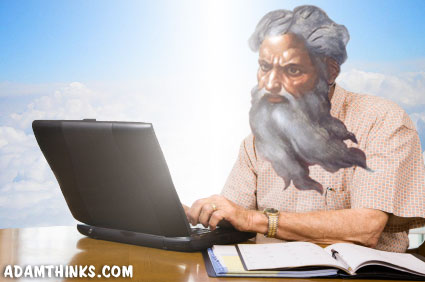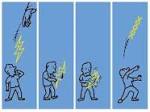In a previous blog I talked about me looking into the possibility of there being a life after death after all, basically questioning my previous beliefs Let me say at the outset that I am still looking and thinking. And still an atheist.
My motive for writing this blog are twofold. First, to comment on some of the reactions and how they can show the difficulties of looking beyond our own beliefs and views. Second, to provide a little more information on the boundaries of my search.
When I posted my first blog there were many good, thoughtful, and supportive comments, which were greatly appreciated. In fact, all comments were appreciated. Some though made arguments against the idea of an afterlife and my search that I thought interesting.
First and foremost, many seemed to think I had already made up my mind.
Despite what I said in my blog about this being the start of a process of questioning and not the end, some seemed to think I had already changed or made up my mind. As I said in the blog, and as I say now, I am still an atheist. I am just an atheist who is questioning core beliefs. There are no set conclusions, no set destination.
For myself, I have always considered occasionally questioning beliefs that you are certain is true is a good thing. For one, it is how many atheists come about. But this also applies to other areas in addition to that of religious beliefs. I am not so arrogant as to assume that all my beliefs, no matter how strongly held, are correct. History shows that they probably will not be. And given that there are so many moral people who are well informed and intelligent who also believe in an afterlife, and a God for that matter, then it seems rational to me to allow the emotion generated by my wife’s death to point out a direction for my reason to explore.
Arguing from biology that a life after death is impossible.
This involved the belief (which has strong support by the way) that our brain is the source of our consciousness. Which would probably mean that no brain, no consciousness. As I have said, I am an atheist. I am very well aware of this and still agree with it for now. Those who brought this up often seemed to think I did not. Or that I was trying to willfully delude myself. Both beliefs about me are wrong.
However, as I said above, this is open to question. Consciousness is still a very unsettled area of science. Its explanation does not rest on as firm a foundation as relativity or evolutionary theory. This piece by Sam Harris, “The Mystery of Consciousness“), shows that even atheists can question whether the brain is the final or complete answer to consciousness. So why not question this assumption, even if it has some support from science? Which, by the way, opens up the possibility of an afterlife without a God. As a matter of interest, I have found at least three atheists who think so and have written about it. I have not read what they had to say yet, but will. And then make my own decision.
Arguing from a traditional view of the afterlife
Some brought up hell and how could I live with the idea of hell and how would I know where my loved ones would wind up. The simple answer is that I am not looking at the traditional ideas of the afterlife as promoted by traditional Christianity, Islam, and Judaism. Yet, that did not seem to occur to those who brought this up, and some continued to do so after I informed them of this.
This assumption of a traditional view of the afterlife, usually Christian (although it fits with Muslim and Jewish too) is not surprising. They did not stop and think to ask what exactly I was looking at and considering. Which, by the way, is actually very normal. We all interpret the world, including the words we read, by our own previous ideas and assumptions. The problem comes in not changing those when they are shown to be incomplete or wrong.
This is one reason why there are young earth creationists, anti-vaxxers, the election was stolen beliefs, and so forth – they have some assumptions that they know are true and are beyond questioning. These are extreme versions of this trait, but it also holds true for even more rational beliefs. And why, when new discoveries are made in science, it can take time for people to be convinced. Some of that is good in the right context and amount – science for example. But, when taken to extremes, always wrong.
While on this about assumptions, let me say I am guilty of the same in this blog. I had started to put in a part about those who argued about the existence of God on the list, stating that I was talking about the afterlife and not the existence of God. However, in rereading my blog I see I did mention God. What I was thinking was not clearly expressed by the words in that blog, but, of course, I remembered the intent and not so much the words when I started to add God to the list above. Until I rechecked my blog.
So, let me now clarify that point. My main focus is on an afterlife. If I can be convinced that there is one without a God, that would be cleaner and easier to do rationally. When God is added to it, then you have various philosophical and moral problems associated with such in addition to the scientific issues with a life after death. But I will say, if strong enough reasons can be given for this hypothetical God, not enough to prove necessarily, but enough so allow for a reasonable belief in such, I may well believe in God. Reasonable would also include having to be a moral God. But, again, that has not happened yet. And most likely will not.
An Observation
Some atheists tried in various ways to convince me that there is no real comfort to be found in believing in an afterlife, or that the comforts provided by atheism in the face of loss of loved ones is just as good as those found by believers. I can only say – huh?
Thinking about the impact my loved one made in so many people’s lives, or thinking that her constituent parts are now part of the universe and eternal, or that even though her name will someday be forgotten but her impact on the world will live on in the generations after her, is somehow as comforting as believing that the woman I loved and talked with and laughed and cried with is still alive as a personality that can feel and see and who I can someday see and be with? As comforting as believing that this woman’s last thoughts were not that of knowing she was going to die soon and of all that she was going to miss – her grandchildren’s upcoming dance recital and the exchange of presents, of going to see Hamilton in January, of future conversations with me and her family and friends – but of knowing that she continued on past this, and while missing all of those events, still aware of them and who could look forward to being reunited not only with loved ones and friends who have already died but also those of us who will someday die?
Not even close.
On my last birthday I received a pocket compass. When the lid is flipped open it, in part, reads “…where and how far this amazing journey takes us I will always and forever be right by your side”. I find much lesser comfort in any belief that means that this is wrong. As would most people.
Or the other tactic of trying to say that a life after death is not to be desired, would be horrible, is most definitely not a thing to want. Usually this is done by arguing only about one possible belief in an afterlife (hell is often a part of this).
I can only say – really?
Those who argued this seem to want to believe that an atheist, a belief in no God and no afterlife, is in every way superior to believing in a God and/or an afterlife. That is wrong.
Atheism is statement of what is perceived to be true on one question, does God exist. Nothing else. No promise of comfort in holding such belief. No promise that holding such belief is going to be better in every way other than being true on that one question from those who do believe. Its only claim is to be a more factual statement on one aspect of reality. There is no promise that that reality is going to be better. That is an emotional response. One revealing more about our needs as human beings that about reality. Of course, this being true, and given what I said, for some people that will be true – an afterlife is not something to be desired, or, probably more common, the comfort atheism affords to loss is the equal of believing in an afterlife. We are varied in our needs and thinking. So, some do feel this to be true. Many though, and I believe even most atheists, when offered a choice would choose life after death as being the more comforting belief.
That does not mean atheism offers no comfort. It does. As many thoughtful atheists pointed out to me, and for which I am grateful. But, while a meal of rice and beans may indeed keep soul and body together, they are not as satisfying, to me at least, as pizza or Tacos with nachos
Clarifications.
Let me now clarify some other aspects of my search.
First, any afterlife which has an eternal hell I will reject on moral reasons alone. Even if such existed I would be against it. Which means I seriously doubt that I would be convinced by any argument or reasoning in such an afterlife (for one thing I would hate to pit myself against a being that could create an eternal hell. I would be seriously outmatched). An afterlife in which we still have struggles and challenges is possible, but hell is a hard no.
Second, I am not going to be a traditional believer. I do not see my becoming Christian, Muslim, Jewish, Buddhist, Hindu or any other religion. Those issues still seem too great for me to do so. It is one reason I mentioned Martin Gardner, since he is a noted skeptic who is not a member of any religious group thinking they all are wrong on significant issues but who nonetheless still believes in a God and, more important to me, a life after death.
As a side note, it was his book “Fads and Fallacies in the Name of Science” that started my transition from believing that ESP and the paranormal were real to realizing that they most likely were not. I have greatly enjoyed his books and his work. And it was his being one of the founding members of Committee for the Scientific Investigation of the Claims of the Paranormal that was part of my motivation for me subscribing to the Zetetic (now the Skeptical Inquirer, of which I am still a subscriber through all its years). It is one reason why, many years ago, I was surprised to find that he believed in God and an afterlife. I have never read why before though. I am now.
Third, I am aware of how our motivations and needs can cause our reasoning to go badly astray. Because of that I am reviewing some material I have read in the past on this and making a conscious effort not to make such errors. Which makes this month’s issue of Skeptical Inquirer with its article “The Irrational World of Motivated Reasoning” rather timely.
Fourth, and final point. I will not proselytize. This is my search and if I wind up changing my views on the afterlife and God, they will be my beliefs. As I have said, when I finally conclude my search I will post a blog on the results, whether I change my beliefs to either believing in an afterlife without a God, an afterlife with a God, or still stay with my current atheist beliefs that neither exist. And will explain why. But no proselytizing beyond that explanation and defense of it if questions and challenges are posed.
As for when the process will be finished, I don’t know. I am still reading Martin Gardner’s book and have several articles and some of other books lined up to read. I will say that for now, my atheisms still holds. In fact, I think it very unlikely that I will change my mind on the non – existence of God. But, in regards to a life after death – while still unlikely it is still a possibility. Smart money would bet against it, but it is less certain now than before.
Final, or rather for the moment final thoughts on this may be ready in two to four months. Or it may be in a year or three. After all, it took me a little over three years of questioning and modifying my beliefs and remodifying them and so forth for me to change from a traditional Christian to an atheist. Although I hope and think it will be closer to two or three months instead of years, it will take what it takes.
Read Full Post »














 She related this down to even everyday tasks and decisions. While she was doing so, at great length, I had a flashback to a paper I wrote while getting my MLA. It was about the Iliad and the role the Greek gods played in it. More specifically, did the Greeks actually believe that the gods took over and controlled people in the manner written in the Iliad.
She related this down to even everyday tasks and decisions. While she was doing so, at great length, I had a flashback to a paper I wrote while getting my MLA. It was about the Iliad and the role the Greek gods played in it. More specifically, did the Greeks actually believe that the gods took over and controlled people in the manner written in the Iliad.










